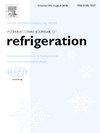Experimental evaluation of natural CO2-based mixtures with hydrocarbons R290 and R1270 in a transcritical refrigeration plant
IF 3.5
2区 工程技术
Q1 ENGINEERING, MECHANICAL
International Journal of Refrigeration-revue Internationale Du Froid
Pub Date : 2025-06-30
DOI:10.1016/j.ijrefrig.2025.06.034
引用次数: 0
Abstract
In light of the low performance of the basic CO2 transcritical refrigeration cycle, this study explores several CO2-hydrocarbon blends to enhance the Coefficient of Performance (COP) and, consequently, minimise the cycle's electrical power consumption. Based on a single-stage cycle with IHX four blends of carbon dioxide/propylene (CO2/R1270) and carbon dioxide/propane (CO2/R290) (96/4 %mass and 94/6 %mass each) were tested at identical operating conditions rejecting heat to three temperature levels (20, 27, and 34 °C) with similar cooling demanding conditions (0 °C). Test results revealed COP improvements at transcritical conditions up to 9.7 % using a 4 %mass of R1270 and up to 4.7 % with a 6 %mass of R290. Furthermore, by adding 4 %mass of R1270, the resulting mixture increases the cooling capacity from 2.3 to 5.8 % regardless of the heat rejection temperature. Finally, the compressor power consumption showed a significant reduction from 1.2 to 7.4 % compared to pure CO2, mainly due to improved compressor efficiencies by mixtures. The results demonstrate the convenience of using CO2 – hydrocarbon mixtures as drop-ins to replace pure CO2 in existing transcritical plants.
跨临界制冷装置中含碳氢化合物R290和R1270的天然co2基混合物的实验评价
鉴于基本二氧化碳跨临界制冷循环的低性能,本研究探索了几种二氧化碳-碳氢化合物混合物,以提高性能系数(COP),从而最大限度地减少循环的电力消耗。基于IHX的单级循环,在相同的操作条件下测试了二氧化碳/丙烯(CO2/R1270)和二氧化碳/丙烷(CO2/R290)的四种混合物(分别为96/ 4%质量和94/ 6%质量),在相似的冷却要求条件(0°C)下拒绝加热到三个温度水平(20、27和34°C)。测试结果显示,在跨临界条件下,使用质量为4%的R1270时,COP可提高9.7%,使用质量为6%的R290时,COP可提高4.7%。此外,通过添加4%质量的R1270,所得到的混合物的冷却能力从2.3%提高到5.8%,而不考虑散热温度。最后,与纯二氧化碳相比,压缩机的功耗显著降低,从1.2%降至7.4%,这主要是由于混合气提高了压缩机的效率。结果表明,在现有的跨临界装置中,使用二氧化碳-碳氢化合物混合物替代纯二氧化碳是很方便的。
本文章由计算机程序翻译,如有差异,请以英文原文为准。
求助全文
约1分钟内获得全文
求助全文
来源期刊
CiteScore
7.30
自引率
12.80%
发文量
363
审稿时长
3.7 months
期刊介绍:
The International Journal of Refrigeration is published for the International Institute of Refrigeration (IIR) by Elsevier. It is essential reading for all those wishing to keep abreast of research and industrial news in refrigeration, air conditioning and associated fields. This is particularly important in these times of rapid introduction of alternative refrigerants and the emergence of new technology. The journal has published special issues on alternative refrigerants and novel topics in the field of boiling, condensation, heat pumps, food refrigeration, carbon dioxide, ammonia, hydrocarbons, magnetic refrigeration at room temperature, sorptive cooling, phase change materials and slurries, ejector technology, compressors, and solar cooling.
As well as original research papers the International Journal of Refrigeration also includes review articles, papers presented at IIR conferences, short reports and letters describing preliminary results and experimental details, and letters to the Editor on recent areas of discussion and controversy. Other features include forthcoming events, conference reports and book reviews.
Papers are published in either English or French with the IIR news section in both languages.

 求助内容:
求助内容: 应助结果提醒方式:
应助结果提醒方式:


